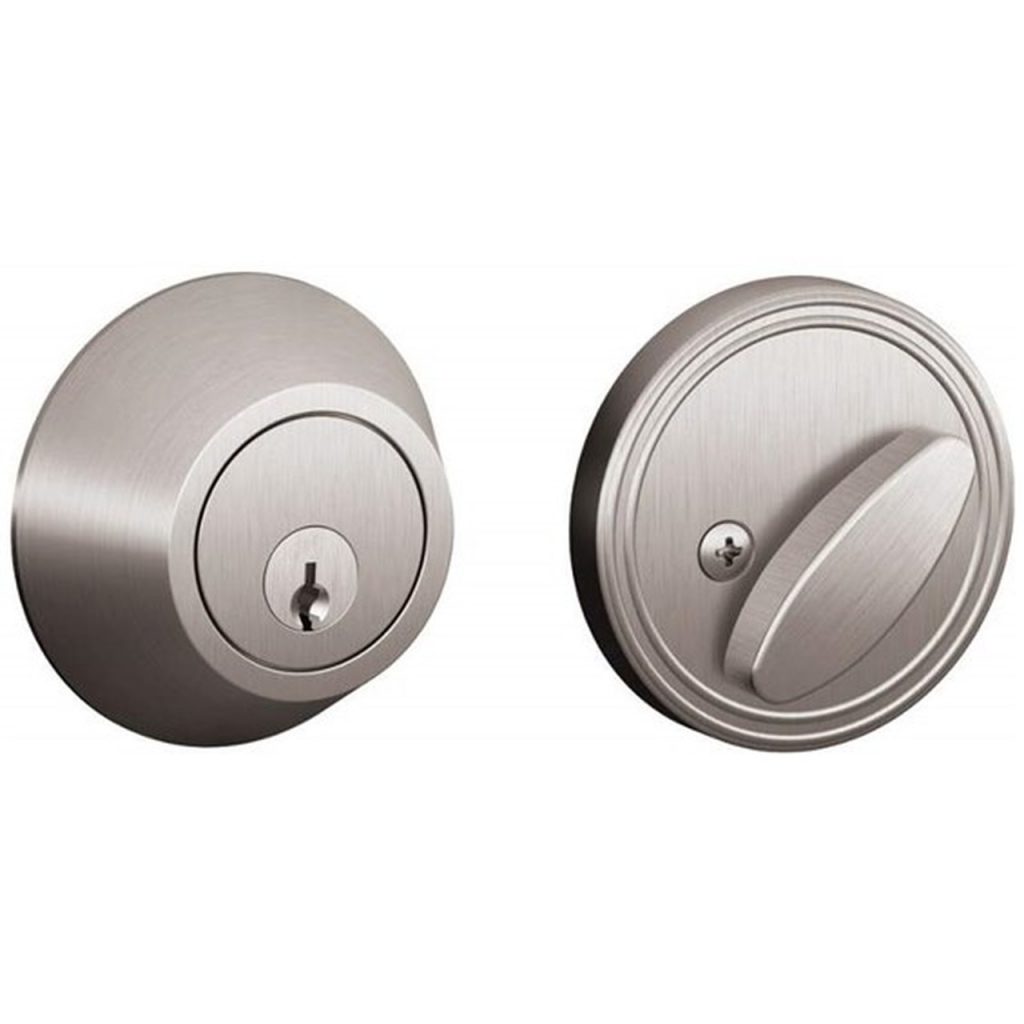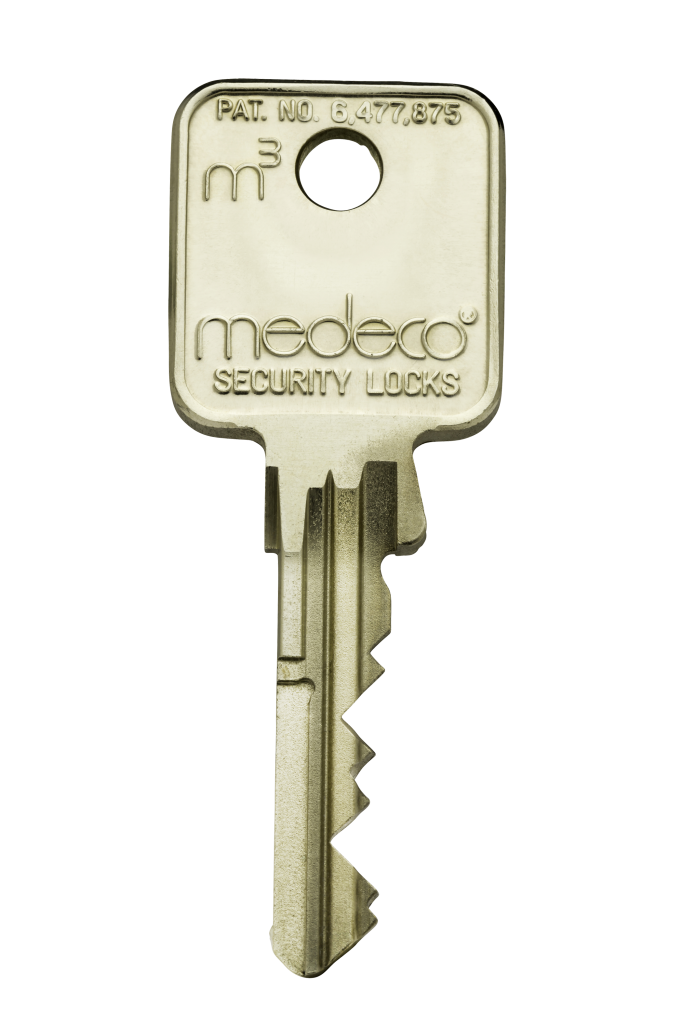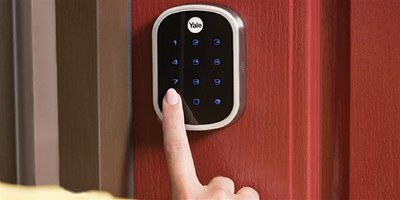When creating a complete home security plan, many homeowners focus on electronic security. For example, burglar alarm systems and video surveillance systems often take first priority. While useful, these plans sometimes fail to address the mechanical side of home security. We consider locks the “front line” of any good residential security plan. After all, high-quality residential locks add security to the main entry points (and therefore main break-in points) of a home. In this post, we share some tips for choosing the right locks for you.
We will begin by addressing the types of locks on the market. Many people install the wrong locks because they do not weigh all of their options. From there, we will discuss how the quality of locks affects security. We will also take a look at how master key systems can add layers of security if approached correctly. Finally, we will examine a couple keypad lock options that can add effectiveness and convenience to your locks! Now, let’s get started with a look at the types of locks you can install in your home.

Single-sided deadbolts, such as this model by Schlage, allow you to unlock the door from the inside without a key.
Decide What Type of Locks You Need
Homeowners have many choices when it comes to door security. In this section, we will discuss the basics of deciding the types of locks you may want. From there, we will get into specifics regarding quality, keying, and even considering some non-conventional locks. For starters, you will need to decide which of your doors have deadbolts, and which only have doorknobs. Deadbolts provide the bulk of your door security, so we recommend installing them on all exterior doors. Furthermore, interior garage doors also make good spots for deadbolts. Homeowners often leave their garage doors open while working around the yard. This can lead to lowered security if someone sees this as an opportunity to break in. Therefore, these doors often deserve the security a deadbolt provides.
Additionally, you will have to decide if you will need a key to unlock your deadbolts from the inside. Most deadbolts have a keyhole on the outside, with a thumb turn on the inside. We call this style of lock a “single-sided” deadbolt. This will allow you to leave the house without using your key. During a fire, this proves especially useful. However, you may want to consider installing a double-sided deadbolt on doors with windows. Double-sided deadbolts have keyholes on both sides of the lock.
Burglars can break through the glass on doors and easily unlock single-sided deadbolts. This makes doors with large windows an ideal place to install double-sided deadbolts. However, we do not recommend installing double-sided deadbolts on doors that you may use to escape a fire. The ability to escape a burning home without a key should remain paramount at all times. Now that we have the basics down, let’s look at choosing the proper quality of lock for you.
Choose the Quality of Your Lock Wisely
Did you know that manufacturers create residential locks with a large variance in quality? In fact, the locks on most homes provide very little security against common lock-picking and drilling attacks. In this section, we will discuss the “grading” system used to distinguish locks of varying qualities. From there, we will discuss your options to choose the locks that best fits your security needs. Let’s get started by looking at what we mean when we discuss a lock’s “grade!”
Standard Residential Locks
The American National Standards Institute (ANSI) and Builders Hardware Manufacturers Association (BHMA) have created a 3-level testing system for lock hardware. Lock manufacturers often seek out ANSI/BHMA certification for their product lines. Tests are meant to gauge factors such as bolt strength, security, the ability to withstand impact and force, and quality of finish, among others. Allegion, one of the biggest global providers of security products, provides this helpful guide to door hardware testing. The lowest-quality hardware receives a “Grade 3” designation, with the best scoring in at Grade 1. As you can probably guess, Grade 2 falls right in the middle. Grade 2 locks represent a step up from Grade 3, without having quite the quality of a Grade 1 lock.
Unfortunately, most locks on homes fall under the Grade 3 category. Burglars can easily pick these locks, or drill them to gain access to your home. You have likely seen locks at a hardware store for a bargain price. Beware, as you will also likely receive a “bargain” level of security with that purchase. With locks as much as with many other products, you often get exactly what you pay for. Look on the packaging to see if you can find an indication for the lock’s grade. If you cannot, assume that you are holding a Grade 3 lock. While installing these locks still beats installing no locks at all, we do not recommend using them. Instead, look into a lock that will last longer while providing more security. Now, let’s look at the next step up in residential door security!

Keys that provide key control, such as those that work with Medeco locks, help you track and limit access to keys.
A Step Above the Average Residential Lock
We prefer installing Grade 2 locks at a minimum for our residential customers. Some common brands (such as Schlage) create both low-quality and mid-quality residential locks. Other companies, such as Arrow, create solid Grade 2 residential locks that generally come at a slightly higher price point. Finally, other companies create high-quality locks and handle sets that also have style in mind. For example, Baldwin creates Grade 2 locks known for both their style and durability. Of course, while shopping around you will notice that the price point for these locks exceeds that of most Grade 2 hardware, as you end up paying for both looks and durability. Now, let’s look at what taking the step up to Grade 1 locks entails!
Locks with Elite Security Features
From a door security standpoint, nothing beats a solid Grade 1 deadbolt. Deadbolts by Medeco, our preferred lock manufacturer, provides security in spades. These locks provide truly unique security against picking. Furthermore, they are sturdy enough to withstand blunt force attacks (such as drilling) as well. As you can expect, the price point on these locks generally exceeds even the highest-end Grade 2 hardware.
Furthermore, some of these locks provide additional security based on their key-control systems. For example, Medeco provides each of their dealers with a patented keyway that gives the installing locksmith full control of that lock system. This means that if we install a Medeco lock, no other locksmith can create a key that works with that lock. Therefore, someone looking to make a copy of your Medeco key will have to come to us.
If someone does visit us for a copy of a Medeco key, we check the customer’s ID to see if it matches up with a list of authorized individuals that you provide us upon installation. If you haven’t authorized our visitor to copy your keys, we turn them away. This ensures that house sitters and contractors do not copy your keys for future use. In addition to key-control systems, we can also use master key systems to give you extra lock security. Next, let’s take a look at how this could work in your home!
Determine a Keying System That Works for You
Many homeowners want one key to open all of a home’s doors. Of course, this means that customers can experience the convenience of carrying one key around to access their entire home. However, by creating a master key system, we can provide this convenience while also allowing you to hand out additional keys that do not allow access to every door in your home! The “master” key in these systems allows for full access to a property. However, these systems also allow you to create separate keys for individual doors or groups of doors as you see fit.
For example, perhaps you want the ability to hand out a key that grants access to a shed without granting that same access to your home. A master key system allows you to do just that! Or perhaps you wish to hand a contractor a key that provides access to the exterior doors only. This will give the access workers need without also allowing them into your bedrooms or office. Master key systems can create this security as well. For more information on these systems, check out our post on Creating an Effective Master Key System. Now, let’s take a look at a couple lock options many customers never even consider taking advantage of!

Smart keypad locks, such as this model by Yale, create added convenience as well as security.
Keypad Lock Options
Keypad locks have steadily risen in popularity over the past several years. We recommend these locks for a couple reasons. For one, keypad locks can add convenience by allowing you to grant access to your home without the need to stop at home yourself. Simply provide a “user” code to the friend or worker who needs access to your home, and you can even choose to delete the code afterwards if you want to make sure that nobody comes back and uses that code to enter the home down the road! Furthermore, keypad locks can solve the problem of people making unwanted key copies. If you use codes, rather than keys, to grant access to your home, you can add and delete codes as needed without worrying about someone creating a key copy to use down the line.
As an additional keypad lock option, we also install smart keypad locks. These locks have all of the features of regular keypad locks, with some additional technology-related features added on! For example, you can lock and unlock a smart lock using an app on your phone. This allows you to grant one-time access to your home without providing a key or a code. Additionally, smart keypad locks can send alerts to your phone. This lets you know who uses a code to unlock your door, and when. The extra security and convenience provided by this technology has made smart keypad locks one of the most popular residential locks we provide.
Putting it All Together to Select the Right Residential Locks
We hope that this post will help you choose the residential locks that work for you. If you have any questions about the material in this post, we encourage you to contact us. We will happily answer any questions you may have that revolve around locks or home security in general. Additionally, we offer free site surveys for homeowners. While on site, we can address any security concerns you may have. Furthermore, we can share some thoughts on any security issues we find during our visit. Together, we can create a security plan involving high-quality locks and any other security measures you feel comfortable with to keep you, your valuables, and your family as safe and secure as possible!
